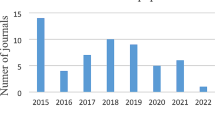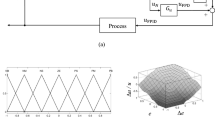Abstract
In this paper, a parallel fuzzy proportional plus fuzzy integral plus fuzzy derivative (FP+FI+FD) controller is proposed. It is derived from the conventional parallel proportional-integral-derivative (PID) controller. It preserves the linear structure of a conventional parallel PID controller, with analytical formulas. The final shape of the controller is a discrete-time fuzzy version of a conventional parallel PID controller. Computer simulations are performed to evaluate the performance of the FP+FI+FD controller for setpoint tracking and load-disturbance rejection for some complex processes, such as first- and second-order processes with delay, inverse response process with and without delay and higher order processes. Also, the performance of the proposed fuzzy controller is evaluated experimentally on highly nonlinear liquid-flow process with a hysteresis characteristic due to a pneumatic control valve. The simulation and real time control is done using National Instrument™ hardware and software (LabVIEW™). The response of the FP+FI+FD controller is compared with the conventional parallel PID controller, tuned with the Ziegler-Nichols (Z-H) and Åström-Hägglund (A-H) tuning technique. It is observed that the FP+FI+FD controller performed much better than the conventional PI/PID controller. Simulation and experimental results demonstrate the effectiveness of the proposed parallel FP+FI+FD controller.
Similar content being viewed by others
References
S. Bennett. Development of the PID controller. IEEE Control System Magazine, vol. 13, no. 6, pp. 58–65, 1993.
G. Chen. Conventional and fuzzy PID controllers: An overview. International Journal of Intelligent and Control Systems, vol. 1, no. 2, pp. 235–246, 1996.
J. Lu, H. Ying, Z. Sun, P. Wu, G. Chen. Realtime ultrasound-guided fuzzy control of tissue coagulation progress during laser heating. Information Science, vol. 123, no. 3–4, pp. 271–280, 2000.
J. Carvajal, G. Chen, H. Ogmen. Fuzzy PID controller: Design, analysis, performance evaluation, and stability analysis. Information Sciences, vol. 123, no. 3–4, pp. 249–270, 2000.
H. X. Li. A comparative design and tuning for conventional fuzzy control. IEEE Transactions on Systems, Man, Cybernetics — Part B Cybernetics, vol. 27, no. 5, pp. 884–889, 1997.
D. Misir, H. A. Malki, G. Chen. Design and analysis of a fuzzy proportional-integral-derivative controller. Fuzzy Sets and Systems, vol. 79, no. 3, pp. 297–314, 1996.
N. Kanagaraj, P. Sivashanmugam, S. Paramasivam. A fuzzy logic based supervisory hierarchical control scheme for real time pressure control. International Journal of Automation and Computing, vol. 6, no. 1, pp. 88–96, 2009.
H. Ying, W. Siler, J. J. Buckley. Fuzzy control theory: A nonlinear case. Automatica, vol. 26, no. 3, pp. 513–520, 1990.
G. Chen, H. Ying. Stability analysis of nonlinear fuzzy PI control systems. In Proceedings of the 3rd International Conference on Industrial Fuzzy Control and Intelligent Systems, IEEE, Houston, TX, USA, pp. 128–133, 1993.
G. Chen, T. T. Pham. Introduction to Fuzzy Systems, Chapman & Hall/CRC Press, 2006.
G. Chen, H. Ying. BIBO stability of nonlinear fuzzy PI control systems. Journal of Intelligence and Fuzzy Systems, vol. 5, no. 3, pp. 245–256, 1997.
H. A. Malki, H. Li, G. Chen. New design and stability analysis of fuzzy proportional-derivative control systems. IEEE Transactions on Fuzzy Systems, vol. 2, no. 4, pp. 245–254, 1994.
J. Lu, G. Chen, H. Ying. Predictive fuzzy PID control: Theory, design and simulation. Information Science, vol. 137, no. 1–4, pp.157–187, 2001.
J. H. Kim, S. J. Oh. A fuzzy PID controller for nonlinear and uncertain system. Soft Computing — A Fusion of Foundations, Methodologies and Applications, vol. 4, no. 2, pp. 123–129, 2000.
K. S. Tang, K. F. Man, G. Chen, S. Kwong. An optimal fuzzy PID controller. IEEE Transactions on Industrial Electronics, vol. 48, no. 4, pp. 757–765, 2001.
W. Chatrattanawuth, N. Suksariwattanagul, T. Benjanarasuth, J. Ngamwiwit. Fuzzy I-PD controller for level control. In Proceedings of International Joint Conference on SICEICASE, IEEE, Busan, Korea, pp. 5649–5652, 2006.
I. D. Landau, G. Zito. Digital Control Systems — Design, Identification and Implementation, Springer, 2006.
K. J. Åström, T. Hägglund. PID Controllers: Theory, Design, and Tuning, 2nd Edition, Instrument Society of America, 1995.
W. Y. Svrcek, D. P. Mahoney, B. R. Young. A Real-time Approach to Process Control, 2nd Edition, John Wiley & Sons, 2006.
F. G. Shinskey. Process Control Systems, 2nd Edition, New York, USA: McGraw-Hill, 1996.
F. G. Shinskey. Robust Process Control, New York, USA: McGraw-Hill, 1979.
J. G. Williams, G. Liu, S. Chai, D. Rees. Intelligent control for improvements in PEM fuel cell flow performance. International Journal of Automation and Computing, vol.5, no. 2, pp. 145–151, 2008.
Author information
Authors and Affiliations
Corresponding author
Additional information
Vineet Kumar received the M. Sc. degree in physics with electronics from Govind Ballabh Pant University of Agriculture and Technology, Pantnagar, India in 1991, and the M.Tech. degree in instrumentation from Regional Engineering College, Kurukshetra, India in 1996. He is currently pursuing Ph. D. degree from Delhi University, Delhi, India. He was a lecturer from 2000 to 2005 at Netaji Subhash Institute of Technology (NSIT). He has also served industry more than 5 years. Since 2005, he has been a senior lecturer of the Department of Instrumentation and Control Engineering, NSIT, Delhi University, Delhi, India. He has developed the Advanced Process Control Lab for research and development with the help of latest hardware and software from National Instrument™, USA.
His research interests include process dynamics and control, intelligent control techniques and their applications, and intelligent process control.
A. P. Mittal received the B.Eng. degree in electrical engineering from Madan Mohan Malaviya Engineering College, Gorakhpur, India, the M.Tech. degree from University of Roorkee, India, and the Ph.D. degree from IIT, Delhi, India.
He was working as a professor in the Electrical Engineering Department at Chhotu Ram State College of Engineering (CRSCE), Murthal, Haryana, India from July 1997 to June 2001. Also, he served as an assistant professor and lecturer at Regional Engineering College (REC), Kurukshrtra and Hamirur, India. Since June, 2001, he has worked as a professor and head of the division of Instrumentation and Control Engineering Department, Netaji Subhas Institute of Technology (NSIT), Delhi University, Delhi, India. He is a senior member of IEEE, USA and a fellow of Institute of Engineers, India.
His research interests include intelligent control, power electronics, and electrical drives.
Rights and permissions
About this article
Cite this article
Kumar, V., Mittal, A.P. Parallel fuzzy P+fuzzy I+fuzzy D controller: Design and performance evaluation. Int. J. Autom. Comput. 7, 463–471 (2010). https://doi.org/10.1007/s11633-010-0528-2
Received:
Revised:
Published:
Issue Date:
DOI: https://doi.org/10.1007/s11633-010-0528-2




